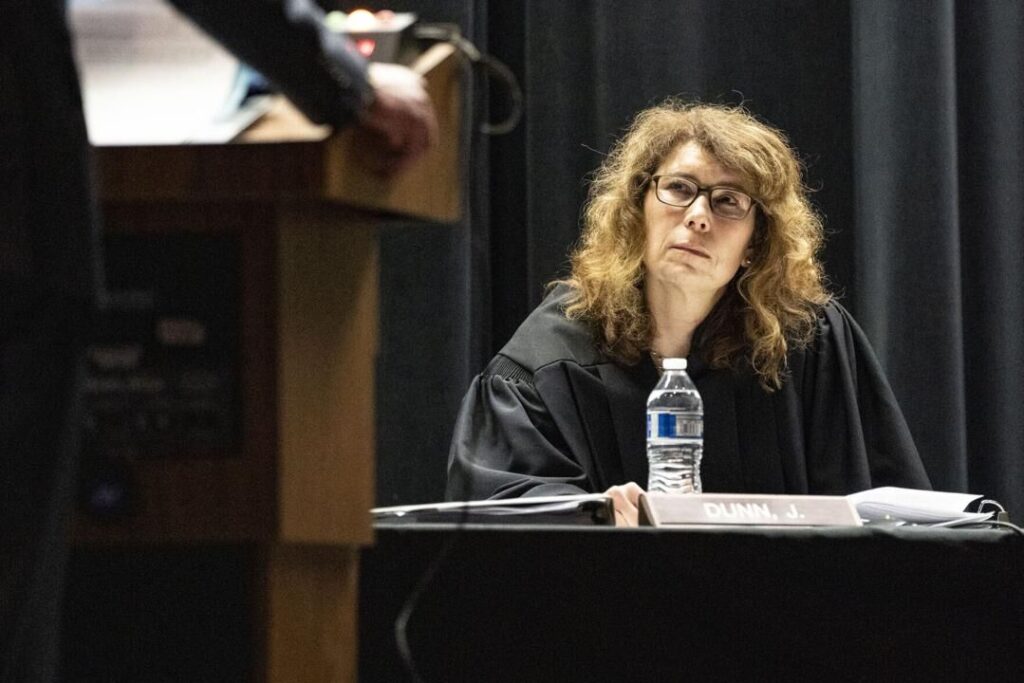Federal judge orders release hearing for torture victim in ‘abhorrent’ immigration custody

(AP Photo/David Zalubowski)
A federal judge on Friday found a “real risk” that the government would try to unlawfully deport a man who was tortured in his home country, and ordered a hearing to determine if he should be released from immigration custody while his case proceeds.
Two years ago, the Denver-based federal appeals court concluded an immigration judge’s decision to deport Dennis Arostegui-Maldonado “defies logic and the law” considering the abuse he experienced from Costa Rican police. Earlier this year, Maldonado received protection from deportation to Costa Rica and El Salvador, his countries of citizenship.
Maldonado then asked U.S. District Court Senior Judge William J. Martínez to release him from custody while the appeal of his immigration case proceeds indefinitely. Martínez declined to take that step, but his Aug. 8 order granted Maldonado the remaining relief he sought: a hearing before an immigration judge to gauge his suitability for release and a prohibition on being transferred out of Colorado.
Martínez, an appointee of Barack Obama, also barred U.S. Immigration and Customs Enforcement from deporting Maldonado “unlawfully.” Based on Maldonado’s testimony that the GEO Group-operated ICE facility in Aurora regularly turns its phones off, Martínez took the unusual step of noting the government possibily removing Maldonado unlawfully was “not merely theoretical nor remote.
“This suggests to the Court that there is a real risk that ICE will initiate efforts to remove Maldonado while severing his ability to seek counsel before he is deported,” he wrote.
As for whether he was confident the government would honor Maldonado’s right to due process, ICE’s “conduct thus far leaves the Court with grave doubts regarding their intent to honor this fundamental requirement.”
Because of the federal rules governing immigration cases, the majority of Maldonado’s proceedings is shielded from public view. However, the prior decision from the U.S. Court of Appeals for the 10th Circuit, coupled with Martínez’s order and a hearing he held last week, provided a fuller picture of Maldonado’s case.
Maldonado repeatedly entered and was removed from the U.S. beginning in 2007. Upon his 2021 reentry, Maldonado testified that Costa Rican police officers kidnapped him at gunpoint and took him to an isolated location. They beat him and sexually assaulted him, demanding he sell drugs on their behalf. They also threatened to kill him if he made a report, and they demanded his family’s contact information. Finally, the officers transported him to jail and held him for 24 hours without any criminal charge.
An immigration judge found him credible, but ultimately denied protection from deportation. Specifically, the judge decided Maldonado had not shown the police who tortured him were acting as government agents at the time.
The 10th Circuit disagreed with that finding and ordered another look, culminating in a new order protecting him from deportation to Costa Rica and El Salvador. The government has since appealed that decision. While the 10th Circuit was looking at his case, the government deported Maldonado — which allegedly resulted in Salvadoran officials having “branded him with a piece of rebar” — but he returned after prevailing at the circuit.
ICE immediately detained him again.
On July 18, Maldonado’s lawyers learned ICE intended to move him somewhere unknown. Martínez, in response, temporarily blocked the removal. He then scheduled a hearing to consider releasing Maldonado.
“I am terrified he will be removed unlawfully like Kilmar Abrego Garcia,” attorney Laura Lunn told Martínez on Aug. 1, referring to a Maryland man wrongfully removed to an El Salvador prison where numerous detainees have described widespread abusive conditions. The federal government did not return Abrego Garcia for months.
“You have a fear that under this administration, (the U.S. Department of Homeland Security) and ICE will not follow the rule of law?” asked Martínez.
“That is exactly what I’m saying,” Lunn replied.
Maldonado took the witness stand and testified that he needs medical attention because of his torture and sexual assault, but he is not receiving care while in custody. He also has no criminal convictions in the U.S. or elsewhere.
“I am not a delinquent. I am not a criminal,” he said. “I really don’t know of any other country that has treated me with the respect and equality I have received here.”
In his order, Martínez found Maldonado’s testimony “articulate, credible, internally consistent, and poignant.” He also credited the testimony of the psychologist who evaluated Maldonado and found his detention harmful.
“In stark contrast,” Martínez continued, the testimony of ICE deportation officer Irma Quinones was “equivocal, uninformed, and unhelpful.”
Ultimately, Martínez declined to order Maldonado’s release outright, reasoning his immigration proceedings will conclude at some point. However, he believed Maldonado was entitled to a hearing at which the government would need to prove his continued detention was justified. In doing so, Martínez followed the lead of other federal judges in Colorado who have determined a lengthy detention without a bond hearing violates the Fifth Amendment right to due process.
“True, there may be a generalized public interest in the enforcement of the country’s immigration laws,” he wrote. “But that cannot mean that (immigration officials) enjoy an unfettered right to detain noncitizens in contravention with their Fifth Amendment rights.”
Martínez also had strong words for the government, calling the conditions at the Aurora detention center “abhorrent” and citing the limited access to medical care and the prison-like atmosphere.
Martínez ordered a release hearing to occur within 14 days.
Lunn, the attorney for Maldonado, said her client feels “relieved” and “grateful.”
“Mr. Maldonado’s case is emblematic of everything that’s wrong with the immigration system. He survived past torture in El Salvador and Costa Rica and the Department of Homeland Security locked him up without a key,” she said. “Today he can breathe a little easier, and I hope that very soon, he will regain his liberty, reunite with his family, and finally live a protected life here in the United States.”
The case is Arostegui-Maldonado v. Baltazar.















